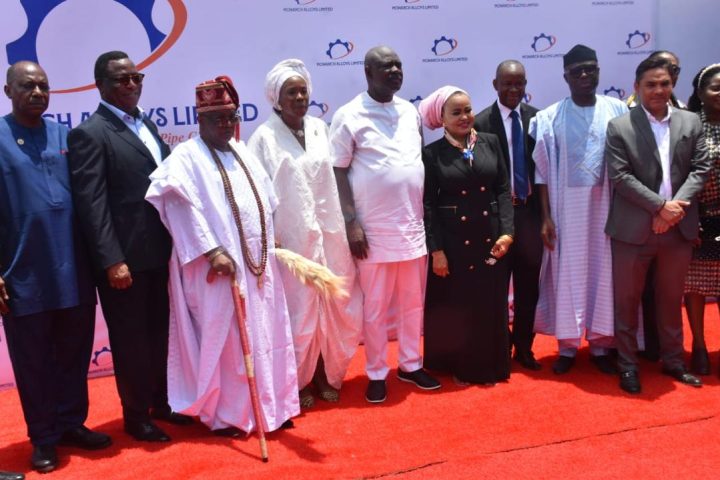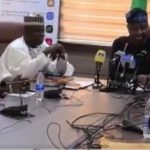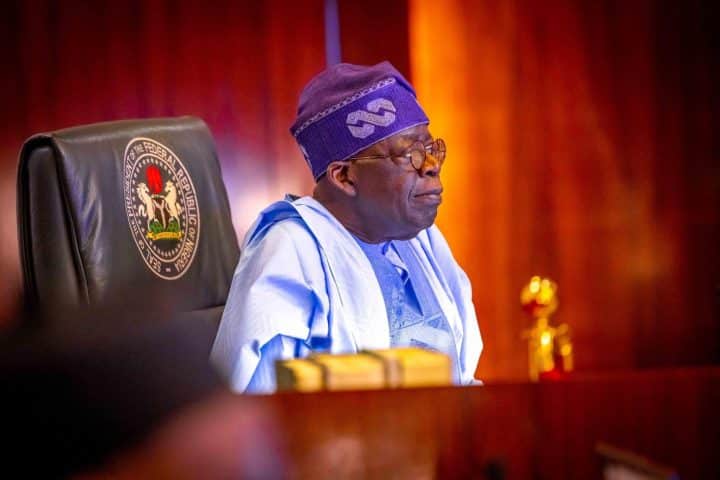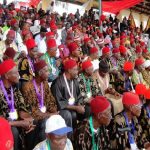In a perfect world the conference of Southeast governors, senators and representatives in Abuja would be contesting the political irrelevance of Ndigbo, lobbying to influence policy, and pulling levers on behalf of their people. Senator Enyinnaya Abaribe was the only one shouting into the wind – at the brazen way Chief Rotimi Amaechi, and Maj. General Buhari bypassed Alaigbo and built new railway tracks all across Nigeria, nay to Maradi in the Republic of Niger.
May God continue to bless and keep Abaribe as the one person in Abuja with a proper vocation to public service. Despite his best efforts, however, no critical mass could be formed there. The other senators and representatives only go to Abuja to collect their _alawi_* and find their way back home. But, in this game of thrones for survival no one is permitted to sit on their palms.
Join our WhatsApp ChannelNDIGBO: The Crying Need For A Think-tank!
So, Ndigbo can redirect their efforts going forward and find a way to conceive and build a framework for a Public Private Partnership between the governors on the one hand and the patriotic Igbo working in different parts of the world on the other, and move forward with that concept.
Here are ten points to ponder:
- Look inwards. This means driving development plans by creating a manufacturing base allocated per regional comparative advantages. Embark on a frontal engagement process with visionary governors: As Chukwuma ‘the Solution’ Soludo assumes office at Awka state house, it is “Tagbo” – (Igbo for: if we start today, we can regard it as timely as long as we do not defer it any longer!) If, as expected, he becomes a transformational governor who is engaged with his constituents then other governors in the neighborhood would emulate him when they see the developmental benefits of PPP.
Apart from frontal engagement we hope also that social media users pull their weight by advising, recommending, and communicating their opinions. In the US, social media activism is high and, in many instances, they generate agenda and narrative, and drive policy. The responsiveness of their governments at all levels to public opinion and ownership is a right and is demanded as such.
- Direct participatory democracy demands also that the citizens should know their senators and representatives in Abuja and petition them to return the favour. Sometimes the impunity of the political tribe could be attributed to the _Siddon Look_* attitude of the people. Again in the US, you see social pressure groups organized to redirect their representatives on public policy.
However, I am glad to note that socio-political activism occurs daily on the Nigeria Twitterverse (NTV). But we could use more of that. Wouldn’t it be a good thing to use NTV to petition General Olusegun Obasanjo, for instance, to explain why the restrictions placed on Ndigbo after the civil war in 1970 are still in place. Why is Ndigbo forbidden to have a seaport? A recent interaction on NTV about Umueri ‘International’ Airport was an eye opener for me: someone wanted to know why there is no direct flight from Europe to Umuleri. It took all of 48 hours but I was able to provide enough historical context.
That interaction had me thinking, perhaps we are not doing enough if a majority of the millennials are so uninstructed. Any wonder the media influence, _Portable_, has more followers on NTV with his banal click baits than all the serious political/socioeconomic commenters and commentators combined?
- Basically, the politics of Igbo Presidency will likely throw up charlatans and fifth columnists, complete with Igbo names, who are poised to inflict harm on Alaigbo on behalf of their true kindred in the Sahel. For instance, with the current dynamics in APC, Igbo President, if it ever comes, may be any of the following – Rotimi Amaechi, Dave Umahi, Chibueze Ngige, Rochas Okorocha, or Orji Uzor Kalu. Of that lot I ask not which one of them is better for Ndigbo, but which one of them is not the absolute worst?
To be fair, comparatively speaking, Ngige has more goodwill than the rest of that class. He overthrew Chris Uba, his political godfather, and gave Anambra state a modicum of good governance. But that very point will make the kingmakers wary of him. So those hollering for Igbo president: be careful what you wish for. If you think the incumbent general from Daura is anti-Igbo, with his anti-commerce land border closures in the south, and import exemptions and favoured trader status for Dangote, wait till you get an Igbo President Chibuike Amaechi, the _Dan Amanar Daura_ of Daura emirate, Katsina state.
- PDP’s Peter Obi is being pressured to run. His heart may not be in it for he has mentioned the systemic weaknesses in the polity that have not been resolved. Peter Obi is a man of integrity and a man of his own mind – his tenure was a high point of ‘god-fatherless’ good governance in Anambra state where he built up a network of passable roads among other achievements. But again, those exemplary leadership qualities are disqualifiers in the minds of the kingmakers who run our ameritocracy.
Thus, bearing in mind that in 2015, Bola Tinubu proved he can defeat an incumbent PDP president and deliver an APC president without the bloc-voting Ndigbo, how is the PDP with Obi as flagbearer going to win?
Let’s do some permutations:
- Southwest – Yoruba youth on NTV are ready to overthrow the feudal tendencies of such political titans as Bola Tinubu. But will their parents follow their lead and vote for PDP and Obi?
- Atlantic and Niger River Delta – will those nations ever overcome their fear of Igbo domination?
- Southeast – Ndigbo fought a war with more alliances offshore (France, Yemen, the Vatican, etc.) than in Nigeria. More than 50 years after, has Ndigbo built any new alliances across the natural geographical/tribal divides in this country?
- Middle Belt/Central Nigeria – Did the Middle Belt get a fair shake in PDP under Obasanjo, Yar’Adua, and Jonathan? The answer to that determines the direction the wind blows for the Middle Belt.
- Northwest – The Hausa are distinct from the Fulani but their strategic interests had always aligned. A political sales job to both sides of that same coin is always tricky. There’s no love lost between Ndigbo and the incumbent president who is Fulani but Ndigbo share very strong trade instincts with the Hausa. So, how will Peter Obi proceed and close his messaging to the Hausa and the Fulani?
Northeast – The Kanuri are a distinct centre of influence in the north. They have maintained great privilege by their socio-political alliance with the Fulani – (They have managed the downstream and upstream sectors of the oil industry that money has been budgeted to re-refine imported impure premium motor spirit. NNPC under the sphere of influence watch of the Kanuri has not processed one gallon of PMS in seven years.)
But the memories of the role Ambassador Baba Gana Kingibe, from the Northeast, played, after the fact, in the annulment of the victory of Chief MKO Abiola at the polls in 1993, with whom he contested the ticket, has lessons for all politicians. How will the horse trading for Peter Obi’s vice presidential candidate go?
PDP sorely needs a Jagaban-like indomitable warrior who can crack knuckles on recalcitrant heads and repurpose the party to reclaim power. – (Jagaban is the nom de guerre for the APC chieftain, Alhaji Bola Ahmed Tinubu.)
General Obasanjo, with his dragon energy, would have been that person, but he has never deployed his talents in service of the South. He’s not going to start with Peter Obi now. Then, there is no such figure in the PDP. That is why vested interests are bogging down the train.
Qua Vadis, Atiku Abubakar? Doesn’t one good turn demand reciprocity?
So, as you embark on a mission to promote the candidacy of Peter Obi for national president, these preceding bullet points need to be fully analyzed.
- Okay. Politics is the art of the possible so you get an Obi president. That is heaven’s best gift to Nigeria after the eight years of the locust: Peter Obi is never going to be a sectional leader. Hopefully he will prioritize the creation of an infrastructural framework for business, and like Ghana’s Nana Akufo-Addo, you will hear him saying: “Nigeria is open for business!”
Even with a national president like Obi, the case for Ndigbo doing things differently becomes even more urgent. All in all, an Obi presidency will be an economic opportunity to be seized.
- So back to strategic thinking for Ndigbo. Look inwards but for inspiration turn your gaze to Israel: How did the world’s most populous and influential Diasporan race – the Jews – drive the massive transformation of the nation of Israel in the last 70 years?
From 1950 until 1965, Israel achieved a high rate of growth: Real GNP (gross national product) grew by an average annual rate of over 11 percent, and per capita GNP by greater than 6 percent. What made this possible? Israel was fortunate in receiving large sums of capital inflows: U.S. aid in the forms of unilateral transfers and loans, German reparations and restitutions to individuals, sale of State of Israel Bonds abroad, and unilateral transfers to public institutions, mainly the Jewish Agency, which retained responsibility for immigration absorption and agricultural settlement. Thus, Israel had resources available for domestic use – for public and private consumption and investment – about 25 percent more than its own GNP. This made possible a massive investment program, mainly financed through a special government budget. Both the enormity of needs and the socialist philosophy of the main political party in the government coalitions led to extreme government intervention in the economy. – Nadav Halevi, Hebrew University
Large influxes of capital have passed through government channels and public organizations and enlarged that sector of the economy that engages in enterprises between the government and private concerns. Government policy dating from the late 1970s, however, has been directed toward privatization. The private, governmental, and, to a limited extent, cooperative sectors all coexist in an economy that supports both the broad objectives of state policy and individual enterprise. – Eliahu Elath & others, Encyclopaedia Britannica
I have preceded this section by two lengthy quotes from scholarly articles to give greater context to the miracle of a prosperous Israel and why she’s worthy of emulation. Jews are everywhere but after the Nazi Holocaust they made America their temporal home and the state of Israel, erected in 1948, became their spiritual and emotional home. Jewish wealth is institutional wealth working daily in Wall Street and managed by the most stable banks. It is buried in prime estates all over the US. Apart from the crash of 2008 the value of real estate has always pointed upwards. So sitting pretty on top of the world’s wealthiest nation, Jews looked towards the Levant, and decided to develop their own homeland which, at a time, was just a parcel of sunbaked real estate in the desert.
They proceeded to do that in an organized way. They used their institutional wealth in the US and made strategic investments in Israel as the development plans of the governments of Israel unfolded. They were brought into partnership for development across time and space.
Institutional wealth is wealth secured in U.S monetary instruments and backed by the prestige of US credit worthiness and the dollar, the legal tender of the world. It is a curious but significant fact to note that after the Great Recession of 2008, the U.S. government bailed out Wall Street and the big banks. Arguably, those banks helped to cause the crisis. Yes, institutional wealth is secured in more senses than one.
Remember always that capital is the most precious legacy you can give to your descendants. (Read your Thomas Piketty again.) Capital multiplies itself as it is passed from generation to generation.
- After security, agriculture was the most important priority for the state of Israel. That meant they had to tame the desert first – they drilled for water like oil; created artificial rivers to water the soil; established massive desalination plants to convert sea water to pipeable/potable water; created dams to irrigate farmlands; and embarked on industrial tree planting to hold together the desert topsoil. We read about the legend of the Kibbutz farm settlements and the heroic efforts of those pioneering rural settlers, but we must remember that foreign direct investments especially from the U.S. were a part of that enterprise.
I said earlier, agriculture powered by the Kibbutz settlers was where the state of Israel started. Imagine where they are today not only in food sufficiency and export of agricultural products but in other economic sectors as well:
- Medicine and pharmaceuticals
- Engineering and construction
- Digital and high-tech industries
- Defence industries, etc.
- The success of Israel therefore has probable lessons for Alaigbo and Ndigbo Diaspora in every ramification. The consummation of a Public Private Partnership: between the governors and Igbo in the Diaspora is sorely needed. Consider this: imagine a hardworking nurse in the US who wishes to help the homeland. His efforts are retail, and more often than not, his investment becomes welfarized because it is popular wisdom in the homeland that dollar flows in only one direction: It flows inbound. It’s rarely flows outbound. It is precious few Diasporans who enjoy a return on their investment in the homeland.
For instance, what happens when this nurse sends saleable cars home: his family sells his car inventory but would most likely render no account; the house he built in the city for rent is occupied pro bono by his kith and kin, the one he built in the village is occupied by his brethren; the sickness of his aged mother is monetized by family and exploited by doctors demanding phone numbers of relatives abroad; merchandise sent home for business rots at Apapa or Tin Can Island ports for months accruing demurrage and depreciation; registration of business name does not have a timeline for conclusion.
The long and short of this experience of doing business in Nigeria for that un-acculturated worker based offshore is very high. In the end he limits himself to what the wire services call – Support for Family and Friends.
Thus does his outlay become welfarized. But note carefully that his FDI, as it were, is subsequently minimized.
- But it does not have to be like that because it was not like that for the Jew in the U.S. driving development in Israel. The high-earning Jewish nurse in America, to stretch the comparison a little more, earned his salaries and emoluments and then converted them to wealth. He did that by availing himself of Jewish agencies and financial advisors on Wall Street who put his earnings to work to generate more income. It is this extra income that he uses to buy into his favorite sector in Israel – agriculture, high tech, medicine, solar, security and defense, and manufacturing.
That might sound elementary but compared to what his counterpart Igbo is doing he is light years ahead. Basically, Ndigbo at home and abroad have retained the pledge and donation mentality to execute social or entrepreneurial projects. Why can’t projects be financed by accruals and dividends on a parallel project based abroad?
(Please don’t mention it: The experience of the Igbo nurse, there I go again, in the US is the same for the Yoruba, the Anioma, the Efik, the Ijaw, the Tiv, the Bini, the Urhobo, and others. I am directing this to Ndigbo but the tribes are interchangeable. The more pertinent question, however, is, “Is it not time to rethink the socioeconomic relationship between all Nigerians earning income offshore and the homeland?”)
- CONCLUSION.
I am not against politics but I think Igbo president is a vanity project. The potential risks of electing an IPINO far outweigh its benefits. Most of Igbo politicians in Abuja, are there for their own interests but we can’t cry forever over that dead horse. Therefore, let us concentrate on the core vocation of Ndigbo and embark on a forward mission to create a manufacturing hub in the homeland to service the West African and African market. Just to be clear Ndigbo has a formidable competitor in the Chinese.
It’s my hope that the Southeast governors would take an integrated approach to development in order to take advantage of economies of scale. They could generate integrated retail development plans with the mission to lay an infrastructural framework to drive down cost centres in Alaigbo for businesses. Cheap manufacturing costs produce competitively-priced goods.
Finally, Ndigbo in the US, for instance, should seek to pool resources and institutionalize their wealth in the US like the Jews did. RTIs on their primary investment in the US should then drive their secondary investment in the homeland. Dr. Godwin Emefiele, the Central Bank governor, and Hajia Zainab Ahmed, the minister of finance, have not managed the Diasporan commonwealth prudently. The Diasporan earnings enable and facilitate the institutional corruption of the kleptocrat class in Nigeria. In a roundabout way, the overworked nurse in the US indirectly works for Emefiele and those he serves. That nurse does not need to work overtime to help the homeland. He can work a little less hard and a little more smartly: that is where the need for an Igbo counterpart for the Jewish agency is sorely needed.
As for politics, let’s not hang our hat on it when we can open up Alaigbo for business. Again, the world is an oyster for the Chinese because they have become the world’s workshop.
Albert Ik Ngene lives in Atlanta
+++
Footnotes
_Alawi_ is short for allowance: The monthly remuneration for a Nigerian senator runs into about $36,000.00 in a country where the minimum wage is a penny short of $72/month, and Statista estimates the unemployment rate to be 33% this year.
_Siddon Look_ is a feeling of helplessness and hopelessness, much like a millipede curling up, which Nigerians adopt as a survival mechanism to cope with the mindless malpractice of governance going on at all levels.



















Follow Us